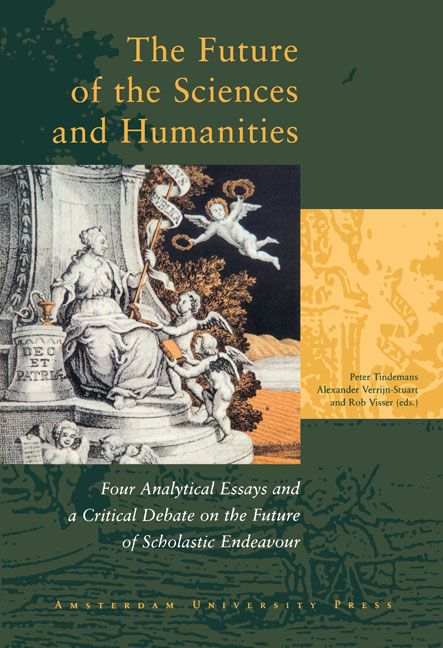 The Future of the Sciences and Humanities
The Future of the Sciences and Humanities Published online by Cambridge University Press: 03 February 2021
Professor van Benthem suggests that the scientific study of cognition and information flow lies outside any of the existing sciences, or indeed any of the generally recognized academic disciplines. This has certainly been my experience after my own research interests moved into that area (from mainstream mathematical logic) in the mid-1980s. Since making that shift, I have not held a regular faculty position at any college or university. My interests simply did not fully accord with my discipline of training, namely mathematics.
For the period 1987-89, I had a research appointment at CSLI, the interdisciplinary research center at Stanford that I now direct. I then took a position as a mathematics department chair at a leading US liberal arts college – a wonderful type of interdisciplinary educational institution not found in Europe. Next, I tried my hand as a dean. And now I find myself back at CSLI, this time as its Executive Director. Throughout this 14-year period, I have regularly taught some mathematics courses and written various books on mathematical topics, but my main scholastic interests have been elsewhere, occupying a hitherto unnamed and almost unacknowledged nether-region having connections to mathematics, logic, computer science, linguistics, philosophy, psychology, sociology, communications, cognitive science, management science, and engineering, and which in the near future will, I believe, involve biology as well. In other words, I have been living for some time now in the scientific world Professor van Benthem describes.
The fact that I have been able to do this for so long indicates that the existing university framework does at least allow some individuals to pursue the kind of scholastic agenda he outlines – at least, for a limited number of such scholars. Of course, the approach I have followed only works for senior academics, already well established in their original disciplines, who can barter experience and administrative skills in exchange for the freedom to pursue such a risky research agenda. On the other hand, the area we are focussing on is not sufficiently well developed to offer a career path for younger scholars; there simply is not yet enough scholarly depth, nor the scholarly metrics and associated publication outlets, for a young scientist to establish her-or himself as an “information and cognition scientist.”
To save this book to your Kindle, first ensure [email protected] is added to your Approved Personal Document E-mail List under your Personal Document Settings on the Manage Your Content and Devices page of your Amazon account. Then enter the ‘name’ part of your Kindle email address below. Find out more about saving to your Kindle.
Note you can select to save to either the @free.kindle.com or @kindle.com variations. ‘@free.kindle.com’ emails are free but can only be saved to your device when it is connected to wi-fi. ‘@kindle.com’ emails can be delivered even when you are not connected to wi-fi, but note that service fees apply.
Find out more about the Kindle Personal Document Service.
To save content items to your account, please confirm that you agree to abide by our usage policies. If this is the first time you use this feature, you will be asked to authorise Cambridge Core to connect with your account. Find out more about saving content to Dropbox.
To save content items to your account, please confirm that you agree to abide by our usage policies. If this is the first time you use this feature, you will be asked to authorise Cambridge Core to connect with your account. Find out more about saving content to Google Drive.